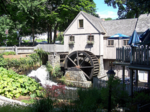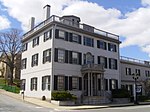Plymouth (; historically also spelled as Plimouth and Plimoth) is a town and county seat of Plymouth County, Massachusetts, United States. Located in Greater Boston, the town holds a place of great prominence in American history, folklore, and culture, and is known as "America's Hometown". Plymouth was the site of the colony founded in 1620 by the Mayflower Pilgrims, where New England was first established. It is the oldest municipality in New England and one of the oldest in the United States. The town has served as the location of several prominent events, one of the more notable being the First Thanksgiving feast. Plymouth served as the capital of Plymouth Colony from its founding in 1620 until the colony's merger with the Massachusetts Bay Colony in 1691. The English explorer John Smith named the area Plymouth (after the city in South West England) and the region 'New England' during his voyage of 1614 (the accompanying map was published in 1616). It was a later coincidence that, after an aborted attempt to make the 1620 trans-Atlantic crossing from Southampton, the Mayflower finally set sail for America from Plymouth, England.
Plymouth is located approximately 40 miles (64 km) south of Boston in a region known as the South Shore. Throughout the 19th century, the town thrived as a center of rope making, fishing, and shipping, and was home to the Plymouth Cordage Company, formerly the world's largest rope making company. It continues to be an active port, but today its major industry is tourism. The town is served by Plymouth Municipal Airport and contains Pilgrim Hall Museum, the oldest continually operating museum in the United States. It is the largest municipality in Massachusetts by area, and the largest in southern New England. The population was 61,217 at the 2020 U.S. census. It is one of two seats of Plymouth County, the other being Brockton.








